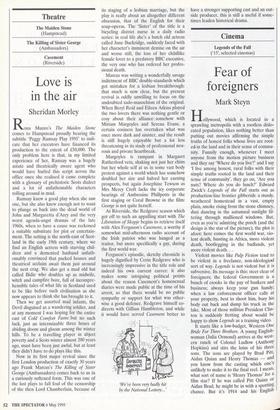Theatre
The Maiden Stone (Hampstead) The Killing of Sister George (Ambassadors) Casement (Riverside)
Love is in the air
Sheridan Morley
Rona Munro's The Maiden Stone comes to Hampstead proudly bearing the subtitle 'Peggy Ramsay Play 1995' to indi- cate that her executors have financed its production to the extent of £50,000. The only problem here is that, in my limited experience of her, Ramsay was a hugely astute and theatrically aware agent who would have hurled this script across the office once she realised it came complete with a glossary of prehistoric Scots dialect and a lot of unfathomable characters rolling around in mud.
Ramsay knew a good play when she saw one, but she also knew enough not to want to plunge us back into the dead world of John and Margaretta d'Arcy and the very worst agenda-angst dramas of the late 1960s, when to have a cause was reckoned a suitable substitute for plot or entertain- ment. The setting is the north-east of Scot- land in the early 19th century, where we find an English actress with starving chil- dren and a demented husband unfath- omably convinced that packed houses and theatrical acclaim await them just around the next crag. We also get a mad old bat called Bidie who doubles up as midwife, witch and campfire bore, full of incompre- hensible tales of what life in Scotland used to be like before such civilisation as she now appears to think she has brought to it.
Then we get assorted mad infants, the Devil disguised as a wandering soldier, and at any moment I was hoping for the entire cast of Cold Comfort Farm: but no such luck, just an interminable three hours of abiding doom and gloom among the winter hills. To be a travelling player in abject poverty and a Scots winter almost 200 years ago, must have beep} just awful, but at least they didn't have to do plays like this.
Now in its first major revival since the first London production of exactly 30 years ago Frank Marcus's The Killing of Sister George (Ambassadors) comes back to us in a curiously softened form. This was one of the last plays to fall foul of the censorship of the then Lord Chamberlain, because of its staging of a lesbian marriage, but the play is really about an altogether different obsession, that of the English for their soap-operas. The 'Sister' of the title is a bicycling district nurse in a daily radio series: in real life she's a butch old actress called June Buckridge, suddenly faced with her character's imminent demise on the air and worse still, the loss of her childlike female lover to a predatory BBC executive, the very one who has ordered her profes- sional death.
Marcus was writing a wonderfully savage indictment of BBC double-standards which got mistaken for a lesbian breakthrough: that much is now clear, but the present revival is oddly unwilling to focus on the undoubted sado-masochism of the original. When Beryl Reid and Eileen Atkins played the two lovers there was nothing gentle or cosy about their alliance: somehow with Miriam Margoyles and Serena Evans, a certain cosiness has overtaken what was once more dark and sinister, and the result is still hugely enjoyable but a lot less threatening in its study of professional neu- rosis and private heartbreak.
Margoyles is rampant in Margaret Rutherford vein, shaking not just her chins but her whole self at us in some vast body protest against a world which has somehow doubled her size and halved her earning prospects, but again Josephine Tewson as Mrs Mercy Croft lacks the icy corporate bearings of Ambrosine Phillpotts in the first staging or Coral Browne in the film: George is not quite herself.
At Riverside, the Redgrave season which got off to such an appalling start with The Liberation of Skopje begins to retrieve itself with Alex Ferguson's Casement, a worthy if somewhat mid-afternoon radio account of the Irish patriot who was hanged as a traitor, but more specifically a gay, during the first world war.
Ferguson's episodic, sketchy chronicle is hugely dignified by Corin Redgrave who is increasingly impressive in the title role and indeed his own current career: it also makes some intriguing political points about the reason Casement's homosexual diaries were made public at the time of his arrest, so that there would be no public sympathy or support for what was other- wise a good defence. Redgrave himself co- directs with Gillian Hambleton, and while it would have served Casement better to `We've been very badly hit by the National Lottery...' have a stronger supporting cast and an out- side producer, this is still a useful if some- times leaden historical drama.


































































 Previous page
Previous page